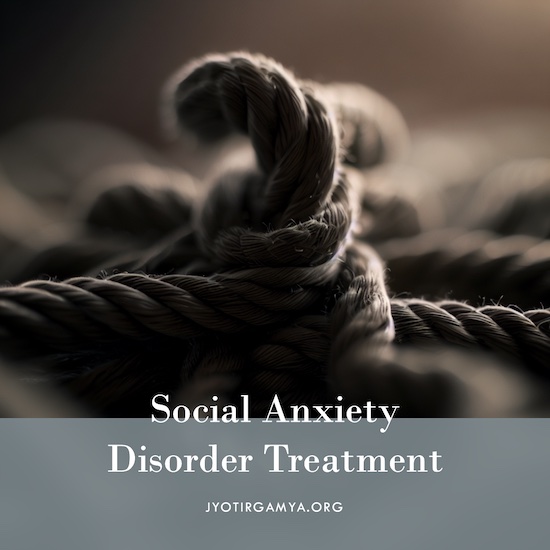Social Anxiety Disorder Treatment
Story: A Trembling Wreck
It was Pooja’s elocution competition. Her mother had prepared her to speak. Pooja gradually walked up to the stage.
She realized her hands were trembling, her palms were sweating, and her body felt shaky; her heart was beating so fast that it could come out of her chest; she felt numb and ran out of breath.
She felt dizzy, and her head would explode the next moment; she could not utter a word and felt the world was closing in on her.
She started fumbling; no matter how hard she tried to prevent it, she could not resist it. It was incredibly embarrassing for her.

None of the motions of planning the words and how she would deliver them mattered.
Her mother knew that her child avoided crowded places at all costs. Whether it be birthday parties, gatherings, or functions, Pooja loathed attending them. Concerned about this, her mother sent her for a public speaking engagement, which backfired severely.
The episode brought extreme stress to Pooja. After the event, she felt like sleeping all day and not doing anything. She had a hard time explaining her problems to other people.
Social Anxiety is a beast. The causes of Social Anxiety could be many.
It feeds on your insecurity while causing havoc in your relationships. It makes you your own harshest critic, constantly questioning your perceptions and seeking confirmation from others.
Once your mind latches onto an idea and refuses to let go of it, it can make you feel like a devil is developing inside you, turning you into a trembling wreck.
The negative thoughts are flooding your mind, and you can’t seem to stop them.
Anxiety drains your energy, makes you feel fatigued, and destroys any semblance of normalcy or safety you may have had.

Let’s say you’re afraid of ghosts and the supernatural, but you’re stuck in a little, creaky cottage in the middle of nowhere - that is what it feels like.
Introduction
Anxiety can be challenging to navigate, affecting various aspects of our lives. With countless strategies available online, it’s essential to remember that what works for one person might not work for another.
Stress and anxiety are prevalent in today’s fast-paced world, impacting everyone differently. It’s crucial to explore a range of strategies tailored to individual needs.

The article explores diverse anxiety management approaches, emphasizing the importance of self-compassion and understanding that what helps one may differ from what helps another.
Social Anxiety Disorder Treatment
“Broadly, there are many strategies for anxiety management. They are all over the internet and social media. However, one crucial point that often gets lost in the discussion and online posts is that different strategies or tools will work for different people.
Some people may find themselves especially sensitive to sleep or nutrition, such that maintaining a steady sleep pattern or eating regular, nutritious meals helps them to manage anxiety and stress.
Other people may have different needs, such as needing a different amount of sleep, falling asleep, or waking up at different times.
Similarly, many people report that they find meditation either guided or unguided to help. However, some people can find it aversive or unpleasant. Ultimately, this means that there are a lot of strategies one can try, but I encourage my patients, families with whom I work, and the public to be gentle with themselves in a journey of finding what works for them.
It will likely be different from the strategies that work for your friend. Similarly, I encourage people to be patient and kind with their children in finding strategies to help them. What helps one child is almost certainly different from what helps another. Even strategies that help one child may differ from those that help their sibling.”
“Anxiety is a natural response to the stress of potential or pending situations that cause discomfort. You can include some actions in your daily schedule to help calm your nerves, relieve anxiety, and take steps toward living in the present.
Exercise: This is especially important if you work a desk job or have a daily routine that limits active time. Try carving 10-30 minutes out of your day to jog, walk, bike, swim, dance, or anything else you enjoy to help get your heart rate up and pump up your endorphins. Endorphins are your brain’s feel-good neurotransmitters. Exercise reduces levels of the body’s stress hormones and can help increase your overall health.
Sleep: Not giving your brain and body enough time to rest can significantly increase stress levels. Giving yourself additional sleep when you feel more anxious than usual can help relieve some of the panic you may be feeling.
Breathe: You may not realize it, but sometimes, our stress levels increase when we do not give our brains enough oxygen. Take time out of your day and focus on your breathing when feeling overwhelmed. You can spend time outside and breathe in some fresh air. Consider taking a casual stroll, practicing yoga, or meditating.
Stay Positive: Negative thoughts can quickly take over your mind when you feel overwhelmed. It can help to take a moment and remember what you are thankful for. You can do this by writing down a list of things that went well or sparked feelings of happiness at the end of each day. Welcome humor, smile, engage with family members and friends in person or on the phone, and strive to do your best instead of seeking perfection.”
First of all, there is a difference between anxiety and anxiety disorder. For example, if you are anxious about an upcoming exam, it might motivate you to study. Even to manage this, you can use psychological relaxation techniques, we can also use meditation, etc. But when it comes to Anxiety Disorders like GAD, OCD, Phobias, etc., one can use Psychometric tests to know the attributes and severity of anxiety; after that, for treatment rather than management, there are so many scientific psychological therapies available like CBT, psychotherapy, counseling, regression therapy, Cognitive Drill Therapy (CDT), etc.
Anxiety is an emotion, and it’s a part of our life experiences. We can’t obliterate anxiety from our nature. A small amount of stress will push you to work hard towards achieving your goals. Some amount of anxiety will help you to be careful about the decisions that you are making. When this anxiety becomes unmanageable and starts hampering your thoughts, emotions, actions, and decisions, you must deal with it proactively.
Some anxiety management tips -
Practicing breathing exercises, grounding techniques, and mindfulness techniques:
Anxiousness creates significant changes in our brain waves. Changing our breathing patterns will always help us to calm down and be mindful. That will help us focus on the present, the first step toward managing our anxiety.
Locus of control:
Analyze what factors are in your control and where you can’t make any change.
We tend to focus more on the negatives in stressful or anxious situations. Try to calm yourself down and then analyze the things in your control, and I can put effort into creating some change in the situation.
Acknowledge and accept:
Anxiety is an emotional state where we feel many feelings together. We may feel nervousness, fear, insecurity, unsafe, lack of control, anger, etc. Don’t tell yourself, I should not feel like this or why this is only happening to me.
Accepting your emotional state and situation will lead you to resolve it.
After making yourself grounded, reflect on 3 questions:
- What factors/ situation is making me anxious?
- What can I do to manage that? Is there a way?
- Do I need anyone’s help in managing this, including professional help?
Working at both levels - cognitive and behavioral Learning and training yourself to be mindful and calm will help you to shift your focus to the present. At the same time, analysis of your cognitive processes will also help you to restructure your anxious thoughts and replace them with more effective and helpful thoughts and beliefs.
Explore: Is it a trait or state of anxiety?
There are 2 types of anxiety.
One is a trait - It’s a part of our personality trait. We all have that intensity, which varies from person to person.
Another one is the state - We feel anxious because of some stressful situation.
Explore more about it and manage your anxiety symptoms accordingly.
Psychoeducate yourself, be aware, and remove faulty ideas about your mental state and emotional experiences; you can seek professional help if needed.
“Anxiety Management occurs when we recognize an anxiety-related issue interfering with their daily functioning.
Anxiety Management includes several techniques that help to reduce the disturbance in your daily life caused by Anxiety. Anxiety management includes lifestyle, Habit, Thought, and emotion management.
It is a process that is not a day’s job. One needs to peel the layer slowly and gradually to understand the root cause of anxiety before managing it.”
Conclusion
In conclusion, managing anxiety is a highly individualized journey with no one-size-fits-all approach. Different strategies work for different people, and being gentle with yourself in this process is crucial.
Seeking professional help and utilizing therapies like CBT, psychotherapy, and cognitive drill therapy can be instrumental in treating anxiety disorders.
Remember that anxiety management is a process, not an instant solution. It requires patience, self-compassion, and a willingness to explore various techniques until you find the best.
While the articles serve as actionable advice from experts, each case could be different, if you are having social anxiety disorder, please consult a therapist for treatment.
That’s all in this edition.
Related Articles on Anxiety
Urge to Control is the Mother of Anxiety
Note to Younger Self on Overcoming Anxiety
Integral Somatic Psychology: New Approach to Anxiety Management
Ten Strategies to Cope with Anxiety
If you liked reading the article, do share it with folks who would benefit from it.
Want to stay connected? Here’s our twitter.